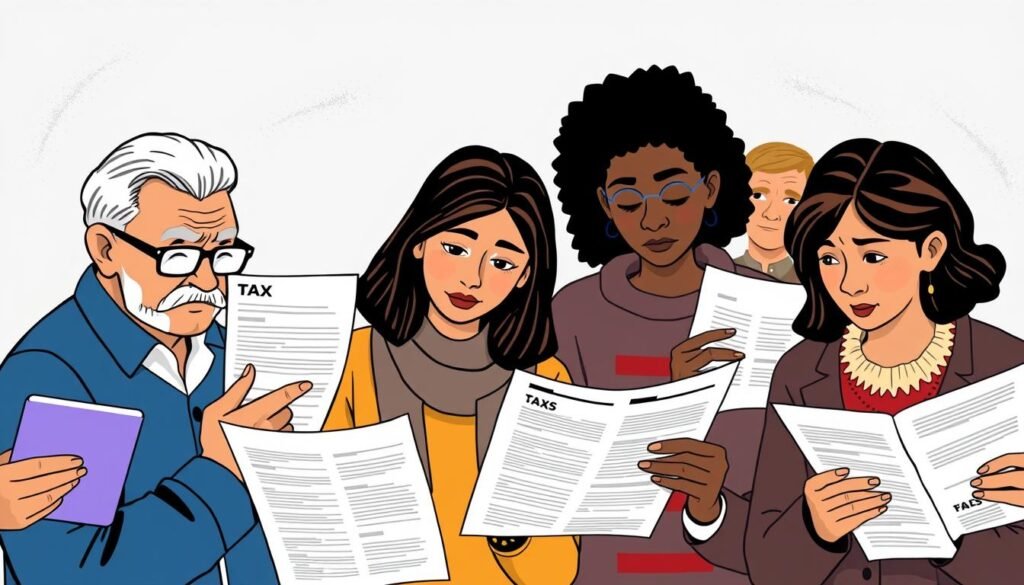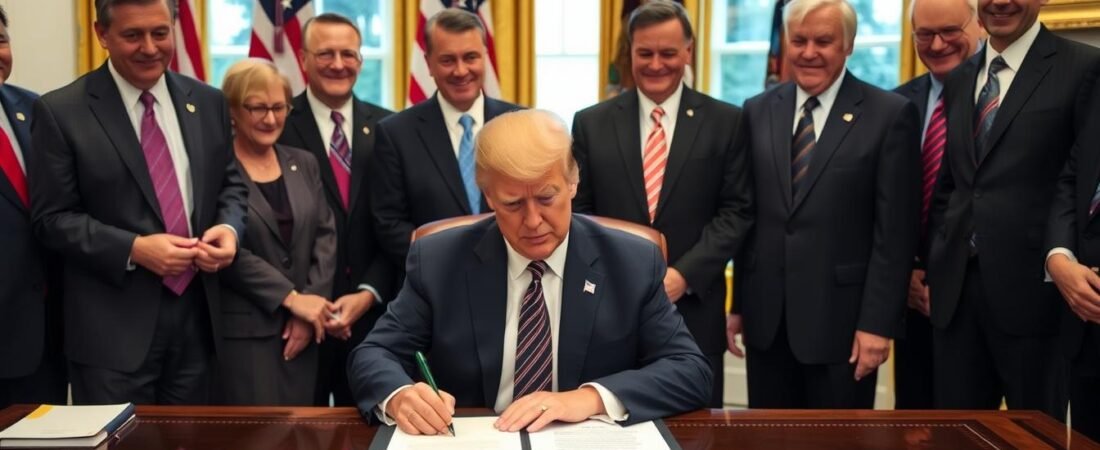The Republican economic bill of 2024, dubbed the “One Big Beautiful Bill Act,” represents one of the most significant legislative achievements of Trump’s second term. With sweeping tax cuts, changes to healthcare funding, and energy policy shifts, this legislation has far-reaching implications for the American economy and political landscape. As the bill moves from passage to implementation, both supporters and critics are questioning whether its economic impacts will help or hurt Republicans in upcoming elections.
This comprehensive analysis examines the bill’s key provisions, historical context, economic projections, and political calculations that may determine whether this legislative gamble pays off for Republicans or becomes a liability in future elections.
Understanding the Republican Economic Bill of 2024
The “One Big Beautiful Bill Act” passed by a narrow margin in both chambers of Congress represents a massive overhaul of tax policy, healthcare funding, and energy regulations. The legislation combines several of Trump’s campaign promises into a single package that will shape economic policy for years to come.
President Trump signs the “One Big Beautiful Bill Act” into law, July 2025
Key Provisions of the Bill
Tax Changes
- Permanent extension of 2017 tax cuts
- Child Tax Credit increase to $2,200 per year
- Temporary elimination of taxes on tips (capped at $25,000)
- Temporary elimination of taxes on overtime (capped at $12,500)
- $10,000 tax deduction on car loan interest for U.S.-assembled vehicles
- $6,000 tax deduction for seniors over 65
Spending and Program Changes
- $150 billion for border security and immigration enforcement
- $150 billion increase in defense spending
- $5 trillion debt ceiling increase
- Expanded Medicaid work requirements
- Reduction in federal Medicaid funding
- Elimination of clean energy tax credits
- Student loan repayment program overhaul
Fiscal Impact
According to the Congressional Budget Office (CBO), the Senate version of the bill will add approximately $3.3 trillion to the national debt over the next decade. This represents a significant increase from the House version, which was projected to add about $2.3 trillion. The administration has argued that increased tariff revenue and economic growth will offset some of these costs, though most independent economists remain skeptical of these claims.
Historical Context: Comparing Major Economic Bills
To understand the potential impact of the Republican economic bill of 2024, it’s helpful to examine how previous major economic legislation affected the economy and subsequent elections.
Reagan’s Economic Recovery Tax Act (1981)
The Reagan tax cuts reduced individual income tax rates by 23% over three years and significantly cut corporate taxes. While supporters credit these cuts with spurring economic growth in the 1980s, critics point to the resulting deficits and the need for subsequent tax increases. Republicans maintained control of the Senate in 1982 but lost 26 House seats.
Bush Tax Cuts (2001 & 2003)
The Bush-era tax cuts reduced income tax rates across all brackets and lowered capital gains taxes. The economy experienced moderate growth following implementation, but the 2008 financial crisis overshadowed any long-term assessment. Republicans gained seats in both the 2002 and 2004 elections, suggesting short-term political benefits.
Obama’s Affordable Care Act (2010)
The ACA represented a major expansion of healthcare coverage and regulation. While it achieved its goal of reducing the uninsured rate, it faced significant political backlash. Democrats lost 63 House seats in the 2010 midterms, demonstrating the political risks of major policy changes.
Biden’s Inflation Reduction Act (2022)
This legislation focused on climate investments, healthcare subsidies, and deficit reduction through corporate tax changes. While Democrats performed better than expected in the 2022 midterms, they still lost control of the House, suggesting mixed political returns.
| Legislation | Year | Key Provisions | Economic Impact | Electoral Impact |
| Reagan Tax Cuts | 1981 | 23% reduction in individual rates, accelerated depreciation | Strong growth, high deficits | Lost 26 House seats in 1982 |
| Bush Tax Cuts | 2001/2003 | Reduced all income tax brackets, cut capital gains taxes | Moderate growth, increased deficits | Gained seats in 2002 and 2004 |
| Affordable Care Act | 2010 | Healthcare coverage expansion, insurance regulations | Reduced uninsured rate, mixed healthcare cost effects | Lost 63 House seats in 2010 |
| Inflation Reduction Act | 2022 | Climate investments, healthcare subsidies, corporate taxes | Clean energy growth, modest inflation impact | Lost House control but outperformed expectations |
| Republican Economic Bill | 2024 | Tax cuts, Medicaid changes, energy policy shifts | Projected $3.3T deficit increase, impacts pending | To be determined |
The historical pattern suggests that major economic legislation often leads to short-term electoral consequences for the implementing party, particularly in midterm elections. Whether the Republican economic bill of 2024 follows this pattern will depend on how quickly its benefits materialize and how voters perceive its impacts on their daily lives.
Stakeholder Perspectives on the Bill
Republican Support
“With one big, beautiful bill, we are gonna make this country stronger, safer and more prosperous than ever before, and every American is going to benefit from that. Today we are laying a key cornerstone of America’s new golden age.”
Republicans have championed the bill as fulfilling key campaign promises and setting the stage for economic growth. They argue that extending the 2017 tax cuts will provide certainty for businesses and investors, while the elimination of taxes on tips and overtime will directly benefit working Americans. The increased funding for border security and defense is framed as essential for national security and economic stability.
Democratic Opposition
“This is a bill that’s going to make the wealthiest people in America wealthier and the poorest people in America poorer, which is, I think, exactly the opposite of what we should be doing right now.”
Democrats have criticized the bill as a reverse Robin Hood that benefits the wealthy at the expense of lower-income Americans. They point to the CBO projection that almost 12 million Americans would lose health insurance coverage due to changes to Medicaid and the Affordable Care Act. The $3.3 trillion addition to the deficit is also a major point of contention, with Democrats arguing it contradicts Republican claims of fiscal responsibility.
Economic Experts
Economic analysts are divided on the bill’s potential impacts. Some conservative economists argue that the tax cuts will stimulate economic growth and job creation, potentially offsetting some of the deficit concerns. Liberal economists counter that the bill’s benefits are skewed toward higher-income Americans and corporations, with limited stimulative effect for the broader economy.
Potential Benefits
- Continued low tax rates for individuals and businesses
- Tax relief for tipped workers and overtime earners
- Increased Child Tax Credit for families
- Potential economic stimulus from tax cuts
- Increased defense and border security funding
Potential Drawbacks
- $3.3 trillion increase in federal deficit
- Estimated 12 million Americans losing health insurance
- Reduced funding for Medicaid and food assistance
- Elimination of clean energy tax credits
- Potential inflationary pressure from deficit spending
Voter Reactions
Early polling suggests a partisan divide in how voters perceive the bill. Republican voters largely support the legislation, viewing it as fulfilling campaign promises and potentially boosting economic growth. Democratic voters overwhelmingly oppose it, concerned about healthcare cuts and deficit increases. Independent voters show mixed reactions, with many taking a wait-and-see approach to how the bill’s provisions will affect their personal finances.
State and Industry-Specific Impacts
The Republican economic bill of 2024 will have varying effects across different states and industries, creating a complex political calculus for the upcoming elections.
Energy Sector
The bill’s elimination of clean energy tax credits and emphasis on fossil fuel production represents a significant shift in energy policy. States with strong oil and gas industries, such as Texas, Oklahoma, and North Dakota, stand to benefit from increased domestic production. Conversely, states that have invested heavily in renewable energy, like California and New York, may see reduced growth in their clean energy sectors.

Oil industry workers in Texas anticipate growth following the bill’s passage
Healthcare Sector
The bill’s changes to Medicaid funding and the Affordable Care Act will significantly impact healthcare providers and patients. Rural hospitals, already operating on thin margins, may face financial strain due to reduced Medicaid reimbursements. States that expanded Medicaid under the ACA, including many Republican-led states, will need to decide whether to increase state funding or reduce coverage.
Colorado Governor Jared Polis wrote to congressional leaders that the SNAP changes alone could cost his state up to $200 million more per year. Similar concerns have been raised by governors across the political spectrum, highlighting the bill’s potential to shift costs from federal to state budgets.
Manufacturing Sector
The $10,000 tax deduction for car loan interest on U.S.-assembled vehicles represents a potential boost for domestic auto manufacturing. States with significant auto manufacturing presence, such as Michigan, Ohio, and Tennessee, may see increased demand for domestically produced vehicles. However, the impact of this provision will depend on consumer behavior and whether the tax incentive is sufficient to change purchasing decisions.
States Potentially Benefiting
- Texas: Fossil fuel production boost, border security funding
- Florida: Senior tax deduction benefits for large retiree population
- Michigan: Auto manufacturing incentives
- Ohio: Manufacturing incentives, overtime tax elimination
- Tennessee: Auto manufacturing, low state tax burden
States Potentially Challenged
- California: Clean energy investment reduction, SALT cap
- New York: SALT cap, healthcare funding reductions
- Colorado: Increased state costs for SNAP and Medicaid
- Massachusetts: Healthcare and clean energy impacts
- Washington: Clean energy investment reduction
These varying impacts across states and industries create a complex electoral map for Republicans heading into future elections. While some traditionally Republican states may see economic benefits that reinforce party loyalty, swing states could experience mixed or negative effects that complicate the political calculus.
Electoral Implications and Political Risks
Midterm Election Vulnerability
Historically, the party controlling the White House tends to lose seats in midterm elections. The Republican economic bill of 2024 adds another variable to this equation. If the bill’s benefits—tax cuts, job creation in certain sectors—materialize quickly, Republicans may mitigate typical midterm losses. However, if negative impacts like healthcare coverage reductions or state budget strains become apparent first, the bill could amplify midterm vulnerabilities.
Swing State Dynamics
The bill’s varied impacts across states create particular challenges in electoral battlegrounds. In Michigan and Wisconsin, the manufacturing incentives may boost Republican support, while Medicaid and SNAP changes could erode it. In Pennsylvania, the fossil fuel provisions may help in western regions while healthcare changes hurt in eastern areas. These cross-cutting effects make the electoral impact difficult to predict.
Demographic Considerations
The bill’s provisions affect different demographic groups in ways that could reshape electoral coalitions. The senior tax deduction may appeal to older voters, a traditionally Republican-leaning group. The elimination of taxes on tips could help with service industry workers, while overtime tax relief targets blue-collar workers. Conversely, healthcare coverage reductions could alienate lower-income voters across demographic groups.
Messaging Challenges
Both parties face messaging challenges around the bill. Republicans need to emphasize immediate benefits while downplaying deficit concerns and healthcare impacts. Democrats must highlight the bill’s costs and coverage reductions without appearing to root against economic growth. The complexity of the legislation makes these messaging tasks particularly difficult.
“I do so deeply desire to have just a normal Congress, but it doesn’t happen anymore. I don’t want to make history, but we’re forced into these situations.”
This statement from Speaker Johnson highlights the political pressure Republicans faced to deliver on campaign promises, even as the legislative process became increasingly contentious. Whether this pressure translates into electoral benefits or liabilities remains to be seen.
Future Economic Scenarios and Long-term Impacts
Best-Case Scenario
In the optimistic view, the tax cuts stimulate economic growth, leading to job creation and wage increases that offset the deficit impact. Energy production increases, reducing prices and further boosting economic activity. States find ways to maintain healthcare coverage despite federal funding reductions, and the overall economic benefits create a positive electoral environment for Republicans.
Worst-Case Scenario
In the pessimistic view, the deficit increase leads to inflation and higher interest rates, dampening economic growth. Healthcare coverage reductions create visible hardships for millions of Americans. State budgets strain under increased Medicaid and SNAP costs, leading to service cuts or tax increases. The economic pain becomes a major liability for Republicans in upcoming elections.
Most Likely Outcome
Reality will likely fall somewhere between these extremes. Some provisions, like the tax cuts and energy production increases, may produce modest economic benefits. Others, like the healthcare changes, will create challenges that vary by state. The electoral impact will depend on timing—whether benefits materialize before costs become apparent—and how effectively each party communicates its narrative about the bill.

Economic analysts project various scenarios following the bill’s implementation
Long-term Structural Changes
Beyond immediate economic and electoral impacts, the bill may create lasting structural changes in the American economy and social safety net. The permanent extension of the 2017 tax cuts cements a lower-tax regime that will shape fiscal policy for decades. The Medicaid funding changes could fundamentally alter the federal-state healthcare partnership established under the ACA.
These structural changes may have consequences that extend far beyond the next election cycle, potentially reshaping party coalitions and policy debates for years to come.
Frequently Asked Questions
Does the Republican economic bill eliminate taxes on Social Security?
No, despite some claims, the bill does not eliminate taxes on Social Security benefits. Instead, it creates a temporary tax deduction for seniors over age 65. The Senate version includes a ,000 deduction that applies to all income, not just Social Security. This deduction would eliminate Social Security tax liability for seniors with adjusted gross incomes of ,000 or less (0,000 for married couples) but would not affect all Social Security recipients.
How does the bill affect the Child Tax Credit?
The bill makes permanent an increase of the Child Tax Credit to ,200 per year, provided that at least one parent has a verifiable Social Security Number. This represents a modest increase from previous levels but falls short of the temporary expansion implemented during the COVID-19 pandemic.
What happens to clean energy investments under this bill?
The bill eliminates or phases out many clean energy tax credits that were established under the Inflation Reduction Act. However, it does include some carve-outs, such as exemptions for solar and wind projects that start construction within one year of the bill’s enactment. The electric vehicle tax credit expires at the end of September 2025 under the Senate version.
How will the bill affect healthcare coverage?
According to the Congressional Budget Office, the Senate version of the bill could result in almost 12 million Americans losing health insurance coverage due to changes to Medicaid and the Affordable Care Act. The bill imposes work requirements for Medicaid eligibility and reduces federal Medicaid funding to states, potentially forcing states to cut coverage or increase their own spending.
What is the impact on the federal deficit?
The CBO estimates that the Senate version of the bill will add approximately .3 trillion to the federal deficit over the next decade. This is about
Frequently Asked Questions
Does the Republican economic bill eliminate taxes on Social Security?
No, despite some claims, the bill does not eliminate taxes on Social Security benefits. Instead, it creates a temporary tax deduction for seniors over age 65. The Senate version includes a $6,000 deduction that applies to all income, not just Social Security. This deduction would eliminate Social Security tax liability for seniors with adjusted gross incomes of $75,000 or less ($150,000 for married couples) but would not affect all Social Security recipients.
How does the bill affect the Child Tax Credit?
The bill makes permanent an increase of the Child Tax Credit to $2,200 per year, provided that at least one parent has a verifiable Social Security Number. This represents a modest increase from previous levels but falls short of the temporary expansion implemented during the COVID-19 pandemic.
What happens to clean energy investments under this bill?
The bill eliminates or phases out many clean energy tax credits that were established under the Inflation Reduction Act. However, it does include some carve-outs, such as exemptions for solar and wind projects that start construction within one year of the bill’s enactment. The electric vehicle tax credit expires at the end of September 2025 under the Senate version.
How will the bill affect healthcare coverage?
According to the Congressional Budget Office, the Senate version of the bill could result in almost 12 million Americans losing health insurance coverage due to changes to Medicaid and the Affordable Care Act. The bill imposes work requirements for Medicaid eligibility and reduces federal Medicaid funding to states, potentially forcing states to cut coverage or increase their own spending.
What is the impact on the federal deficit?
The CBO estimates that the Senate version of the bill will add approximately $3.3 trillion to the federal deficit over the next decade. This is about $1 trillion more than the House version. The administration argues that increased tariff revenue and economic growth will offset some of this deficit increase, though most independent economists are skeptical of these claims.
trillion more than the House version. The administration argues that increased tariff revenue and economic growth will offset some of this deficit increase, though most independent economists are skeptical of these claims.
Conclusion: A Political and Economic Gamble

American voters weigh the personal and national implications of the economic bill
The Republican economic bill of 2024 represents a significant gamble for the party, both economically and politically. By implementing sweeping tax cuts, healthcare changes, and energy policy shifts, Republicans have created a legislative legacy that will shape the economy for years to come. Whether this gamble pays off electorally depends on numerous factors: how quickly benefits materialize, how visible costs become, how effectively each party communicates its narrative, and how voters ultimately judge the bill’s impact on their lives.
Historical precedent suggests that major economic legislation often leads to short-term electoral consequences, particularly in midterm elections. The complexity and far-reaching nature of this bill, however, make historical comparisons imperfect. The varied impacts across states, industries, and demographic groups create a multifaceted electoral equation that defies simple prediction.
What is clear is that both parties will use this bill to frame their economic narratives heading into future elections. Republicans will highlight tax relief, job creation, and fulfilled campaign promises. Democrats will emphasize healthcare coverage reductions, deficit increases, and benefits skewed toward higher-income Americans. Voters will ultimately decide which narrative better aligns with their lived experience under the bill’s provisions.
As the implementation unfolds and impacts become clearer, the answer to our central question—whether the Republican economic bill of 2024 represents a risky gamble for the party—will emerge. Until then, Americans across the political spectrum will be watching closely to see how this massive legislation affects their wallets, their healthcare, and their economic future.
